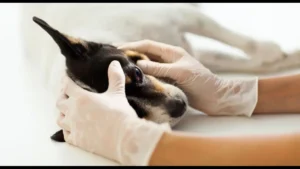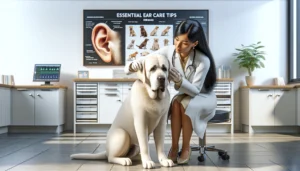Caring for your dog’s teeth is important for his overall health and well-being. Just like people, dogs can have dental problems. These problems can cause pain, discomfort, and even serious health problems. In this article, we give you 8 important tips to help you take good care of your dog’s teeth.
Table of Contents
Toggle1. Regular Brushing:
Brushing your dog’s teeth regularly is one of the best ways to keep your dog’s teeth healthy. To clean your dog’s teeth, use a soft-bristled toothbrush and toothpaste that is safe for dogs. First, keep meetings short. As your dog gets used to it, you can slowly increase the time. For best results, brush your dog’s teeth at least two to three times a week.
2. Choose the Right Tool:
Choosing the right oral care aid is important for effective brushing. If you don’t want to damage your dog’s gums, choose a soft-bristled toothbrush. Dog toothpaste comes in different flavors, such as chicken or beef, so your furry friend will prefer it. Do not use toothpaste intended for humans for your dog; it may contain ingredients that are harmful to the dog.
3. Provide Toys and Chews:
Dogs naturally like to chew, which helps keep their teeth clean. Invest in chews or toys that keep your teeth healthy. Often, the texture of these products prevents plaque and tartar buildup and keeps your dog happy. Make sure these items are appropriate for your dog’s size and the way he likes to chew.
4. Visit the Dentist Regularly:
To keep a close eye on your dog’s oral health, you should have regular dental checkups with your vet. A dentist may be required to treat plaque and tartar that are difficult to remove by regular brushing. In addition, your vet can detect any dental problems early and prevent them from getting worse.
5. Healthy Eating:
What your dog eats is very important to keep his teeth healthy. A balanced diet benefits your dog’s overall health. Snacks or foods made specifically for dental health may contain ingredients that help remove plaque and tartar. For optimal oral health, consult with your veterinarian about which diet is best for your dog.
6. Look for Changes in Teeth:
Pay close attention to any changes in your dog’s behavior or the appearance of his teeth and gums. Bad breath, swollen or bleeding gums, difficulty chewing,g and changes in appetite are all signs of dental problems. If you notice any of these symptoms, you should contact your vet immediately to avoid dental problems.
7. Stay Away From Harmful Substances:
Several things can be harmful to your dog’s oral health. Don’t give your dog treats or foods that are high in sugar or foods that people eat as this can aggravate his teeth. Also,o be careful with hard toys and other things that can damage your dog’s teeth. Always give your dog something safe and suitable to chew.
8. Be Patient and Gentle:
To ensure that your dog enjoys dental care, he must be cooperative. When brushing, be patient and gentle and use positive reinforcement. Give your dog a treat or treat as a reward to make the experience great. This makes the process more enjoyable for your dog and makes him more likely to want to participate in routine dental care.
Conclusion
Implementing these eight important dental care tips for your dog will have a big impact on his overall health and well-being. To keep your dog’s teeth healthy and happy, brush him regularly, use the right tools, give him teeth to chew on, take him to the vet for a check-up, feed him a healthy diet, watch for change,s and keep him away from harmful substances, and remain patient. Remember, taking an active role in your furry friend’s oral care will be worth it in the long run, ensuring he or she has a lifetime of good dental health.
FAQs
1. Why is dental care for dogs important?
Dogs need to take good care of their teeth so that they do not develop problems that can lead to pain, discomfort,t or even serious health problems. Maintaining good oral hygiene is an important part of overall health, so make sure your dog stays happy and healthy.
2. What is the best way to brush my dog’s teeth?
You should brush your dog’s teeth at least two to three times a week. First, keep meetings short. As your dog gets used to the process, you can slowly increase the time.
3. How should I brush my dog’s teeth? What should I use?
Choose a soft-bristled toothbrush designed specifically for dogs and a dog-safe toothpaste. Do not use toothpaste intended for humans on your dog, as it may contain ingredients that are harmful to the dog.
4. Do dental toys and chews help clean teeth?
Yes, dental toys and chews help keep your teeth healthy. They keep your dog happy and help remove plaque and tartar. Make sure these items are appropriate for your dog’s size and the way he likes to chew.
5. How often should I take my hat to the vet for a dental check-up?
It is important to take your hat to the vet for regular dental checkups. The frequency may change, but it is best to discuss the schedule during regular vet visits. If plaque or tartar builds up, you may need to have your teeth cleaned by a professional.
6. Will feeding my dog a healthy diet help his teeth?
A balanced diet is an important part of keeping your dog’s teeth healthy. Snacks or foods made specifically for dental health may contain ingredients that help remove plaque and tartar. Talk to your vet to find out which diet is best for your pet.


